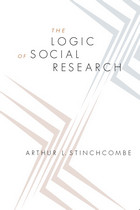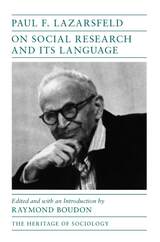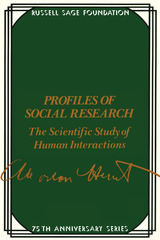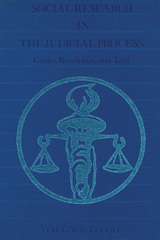6 books about Social Research

Liberating Method
Feminism and Social Research
Marjorie Devault
Temple University Press, 1999
Feminist scholars, and those inspired by other liberatory movements, have raised profound questions about the standard practices of social research. Arguing that established methods too often ignore and obfuscate social oppression, they search for approaches that will more adequately represent marginalized groups and the social processes that organize their lives. Liberating Method charts one researcher's view of this project as Marjorie L. DeVault, one of the leading practitioners and teachers of feminist methodology, examines in her collection of new and previously published essays the dimensions of feminist research.
DeVault believes in "writing carefully," that is with care (precision) and caring (empathy). In addition to essays on how women write, are silenced, and can speak up, she includes an autobiographical sketch, a discussion of "the self as resource," and a section on what she calls "excavation," or the work of recovering unrecognized or suppressed aspects of women's experience. She explores the sources and meanings of feminist methodology, the strategies of reflexive analysis, and the issues that arise when writing and teaching feminist research. Committed to a feminism attentive to oppressions that operate simultaneously with gender, DeVault considers exclusions and distortions in feminist research and strategies for building more inclusive approaches. Including a closing essay that presents "practical advice" for oppositional researchers, LiberatingMethod reflects DeVault's conviction that feminist insights can and should contribute to a sounder, more rigorous social science.
DeVault believes in "writing carefully," that is with care (precision) and caring (empathy). In addition to essays on how women write, are silenced, and can speak up, she includes an autobiographical sketch, a discussion of "the self as resource," and a section on what she calls "excavation," or the work of recovering unrecognized or suppressed aspects of women's experience. She explores the sources and meanings of feminist methodology, the strategies of reflexive analysis, and the issues that arise when writing and teaching feminist research. Committed to a feminism attentive to oppressions that operate simultaneously with gender, DeVault considers exclusions and distortions in feminist research and strategies for building more inclusive approaches. Including a closing essay that presents "practical advice" for oppositional researchers, LiberatingMethod reflects DeVault's conviction that feminist insights can and should contribute to a sounder, more rigorous social science.
[more]

The Logic of Social Research
Arthur L. Stinchcombe
University of Chicago Press, 2005
Arthur L. Stinchcombe has earned a reputation as a leading practitioner of methodology in sociology and related disciplines. Throughout his distinguished career he has championed the idea that to be an effective sociologist, one must use many methods. This incisive work introduces students to the logic of those methods.
The Logic of Social Research orients students to a set of logical problems that all methods must address to study social causation. Almost all sociological theory asserts that some social conditions produce other social conditions, but the theoretical links between causes and effects are not easily supported by observation. Observations cannot directly show causation, but they can reject or support causal theories with different degrees of credibility. As a result, sociologists have created four main types of methods that Stinchcombe terms quantitative, historical, ethnographic, and experimental to support their theories. Each method has value, and each has its uses for different research purposes.
Accessible and astute, The Logic of Social Research offers an image of what sociology is, what it's all about, and what the craft of the sociologist consists of.
The Logic of Social Research orients students to a set of logical problems that all methods must address to study social causation. Almost all sociological theory asserts that some social conditions produce other social conditions, but the theoretical links between causes and effects are not easily supported by observation. Observations cannot directly show causation, but they can reject or support causal theories with different degrees of credibility. As a result, sociologists have created four main types of methods that Stinchcombe terms quantitative, historical, ethnographic, and experimental to support their theories. Each method has value, and each has its uses for different research purposes.
Accessible and astute, The Logic of Social Research offers an image of what sociology is, what it's all about, and what the craft of the sociologist consists of.
[more]

On Social Research and Its Language
Paul F. Lazarsfeld
University of Chicago Press, 1993
Without Paul F. Lazarsfeld the social sciences would not be what they are today. In his ground-breaking work on unemployment, voting, consumer behavior, and social influence, among other subjects, his methodological emphasis on vigorously controlled scientific language and structures transformed social research worldwide.
Lazarsfeld's systematic criticism of observational, conceptual, and inferential procedures in sociology led to the the formation of universally applied observational and analytical techniques, such as the panel design of observation and contextual and multivariate analysis. His methodology for empirical social research had a profound effect on all the social sciences.
The eighteen essays in On Social Research and Its Language illustrate the diversity of Lazarsfeld's substantive, methodological, and organizational interests. Spanning the years 1933 to 1972, they encompass his own works of social research, as well as writings on methodology and the history and sociology of social research. Articles on methodology—observing, classifying and building typologies, analyzing the relations between variables, qualitative analysis, and macrosociology—form the bulk of the book. In addition, Raymond Boudon provides a revealing biography of Lazarsfeld and his influence on sociology.
These classic writings by a formative figure of modern social science will be an indispensable reference for scholars across the historical and social science disciplines.
Lazarsfeld's systematic criticism of observational, conceptual, and inferential procedures in sociology led to the the formation of universally applied observational and analytical techniques, such as the panel design of observation and contextual and multivariate analysis. His methodology for empirical social research had a profound effect on all the social sciences.
The eighteen essays in On Social Research and Its Language illustrate the diversity of Lazarsfeld's substantive, methodological, and organizational interests. Spanning the years 1933 to 1972, they encompass his own works of social research, as well as writings on methodology and the history and sociology of social research. Articles on methodology—observing, classifying and building typologies, analyzing the relations between variables, qualitative analysis, and macrosociology—form the bulk of the book. In addition, Raymond Boudon provides a revealing biography of Lazarsfeld and his influence on sociology.
These classic writings by a formative figure of modern social science will be an indispensable reference for scholars across the historical and social science disciplines.
[more]

Profiles of Social Research
The Scientific Study of Human Interaction
Morton M. Hunt
Russell Sage Foundation, 1985
This splendid introduction to social research describes an area of scientific investigation that profoundly influences our daily lives and thoughts, but about which most of us know very little. We can picture a research chemist at work, white-coated and surrounded by beakers and test tubes—but what is the nature of social research? For interested general readers and particularly for students entering the various social science fields, Morton Hunt paints an immensely informative and accessible portrait. He begins with a lucid overview of the important varieties of social research, describing their advantages and limitations. Against this background, Hunt then details five remarkable case histories, eyewitness accounts of significant recent episodes in social research. Woven skillfully through each narrative are explorations of the basic methodological, practical, moral and political issues raised by social research. The story of a noteworthy series of sociopsychological experiments on teamwork, for example, enables Hunt to weigh the merits of using a laboratory setting to study social behavior and the ethics of deceiving human subjects. In similar fashion, Hunt depicts a historic cross-sectional survey on segregated schooling; a complex attempt to measure the impact of welfare programs; a real-world experiment with guaranteed annual incomes; and a path-breaking study of human aging that followed its subjects for a generation. This engaging and intelligent book will give readers a new understanding of the breadth and richness of social research as well as an informed appreciation of its significance for their lives.
[more]

The Rhetoric of Social Research
Understood and Believed
Hunter, Albert
Rutgers University Press, 1990
.
[more]

Social Research in the Judicial Process
Cases, Readings, and Text
Wallace D. Loh
Russell Sage Foundation, 1984
"How to inform the judicial mind," Justice Frankfurter remarked during the school desegregation cases, "is one of the most complicated problems." Social research is a potential source of such information. Indeed, in the 1960s and 1970s, with activist courts at the forefront of social reform, the field of law and social science came of age. But for all the recent activity and scholarship in this area, few books have attempted to create an intellectual framework, a systematic introduction to applied social-legal research. Social Research in the Judicial Process addresses this need for a broader picture. Designed for use by both law students and social science students, it constructs a conceptual bridge between social research (the realm of social facts) and judicial decision making (the realm of social values). Its unique casebook format weaves together judicial opinions, empirical studies, and original text. It is a process-oriented book that teaches skills and perspectives, cultivating an informed sensitivity to the use and misuse of psychology, social psychology, and sociology in apellate and trial adjudication. Among the social-legal topics explored are school desegregation, capital punishment, jury impartiality, and eyewitness identification. This casebook is remarkable for its scope, its accessibility, and the intelligence of its conceptual integration. It provides the kind of interdisciplinary teaching framework that should eventually help lawyers to make knowledgeable use of social research, and social scientists to conduct useful research within a legally sophisticated context.
[more]
READERS
Browse our collection.
PUBLISHERS
See BiblioVault's publisher services.
STUDENT SERVICES
Files for college accessibility offices.
UChicago Accessibility Resources
home | accessibility | search | about | contact us
BiblioVault ® 2001 - 2024
The University of Chicago Press









